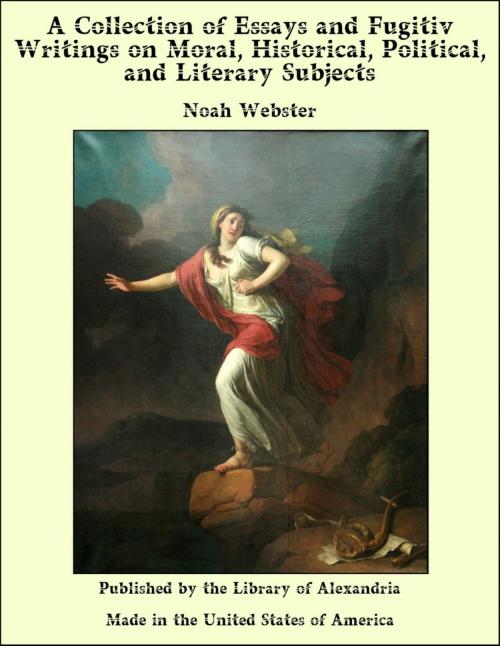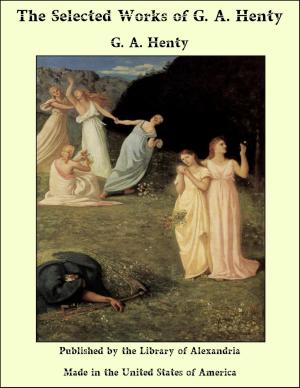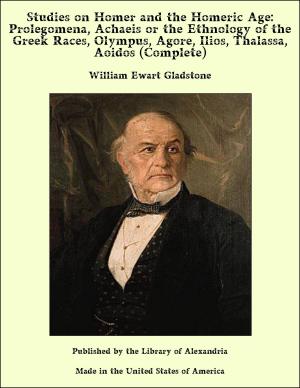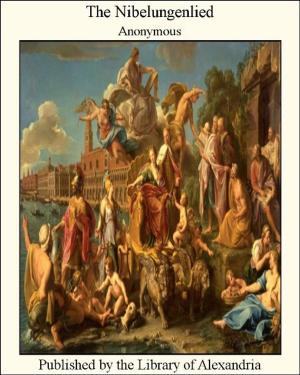A Collection of Essays and Fugitiv Writings on Moral, Historical, Political, and Literary Subjects
Nonfiction, Religion & Spirituality, New Age, History, Fiction & Literature| Author: | Noah Webster | ISBN: | 9781465599865 |
| Publisher: | Library Of Alexandria | Publication: | July 29, 2009 |
| Imprint: | Language: | English |
| Author: | Noah Webster |
| ISBN: | 9781465599865 |
| Publisher: | Library Of Alexandria |
| Publication: | July 29, 2009 |
| Imprint: | |
| Language: | English |
The Education of youth is, in all governments, an object of the first consequence. The impressions received in early life, usually form the characters of individuals; a union of which forms the general character of a nation. The mode of Education and the arts taught to youth, have, in every nation, been adapted to its particular stage of society or local circumstances. In the martial ages of Greece, the principal study of its Legislators was, to acquaint the young men with the use of arms, to inspire them with an undaunted courage, and to form in the hearts of both sexes, an invincible attachment to their country. Such was the effect of their regulations for these purposes, that the very women of Sparta and Athens, would reproach their own sons, for surviving their companions who fell in the field of battle. Among the warlike Scythians, every male was not only taught to use arms for attack and defence; but was obliged to sleep in the field, to carry heavy burthens, and to climb rocks and precipices, in order to habituate himself to hardships, fatigue and danger. In Persia, during the flourishing reign of the great Cyrus, the Education of youth, according to Xenophon, formed a principal branch of the regulations of the empire. The young men were divided into classes, each of which had some particular duties to perform, for which they were qualified by previous instructions and exercise. While nations are in a barbarous state, they have few wants, and consequently few arts. Their principal objects are, defence and subsistence; the Education of a savage therefore extends little farther, than to enable him to use, with dexterity, a bow and a tomahawk. But in the progress of manners and of arts, war ceases to be the employment of whole nations; it becomes the business of a few, who are paid for defending their country. Artificial wants multiply the number of occupations; and these require a great diversity in the mode of Education. Every youth must be instructed in the business by which he is to procure subsistence. Even the civilities of behavior, in polished society, become a science; a bow and a curtesy are taught with as much care and precision, as the elements of Mathematics. Education proceeds therefore, by gradual advances, from simplicity to corruption. Its first object, among rude nations, is safety; its next, utility; it afterwards extends to convenience; and among the opulent part of civilized nations, it is directed principally to show and amusement.
The Education of youth is, in all governments, an object of the first consequence. The impressions received in early life, usually form the characters of individuals; a union of which forms the general character of a nation. The mode of Education and the arts taught to youth, have, in every nation, been adapted to its particular stage of society or local circumstances. In the martial ages of Greece, the principal study of its Legislators was, to acquaint the young men with the use of arms, to inspire them with an undaunted courage, and to form in the hearts of both sexes, an invincible attachment to their country. Such was the effect of their regulations for these purposes, that the very women of Sparta and Athens, would reproach their own sons, for surviving their companions who fell in the field of battle. Among the warlike Scythians, every male was not only taught to use arms for attack and defence; but was obliged to sleep in the field, to carry heavy burthens, and to climb rocks and precipices, in order to habituate himself to hardships, fatigue and danger. In Persia, during the flourishing reign of the great Cyrus, the Education of youth, according to Xenophon, formed a principal branch of the regulations of the empire. The young men were divided into classes, each of which had some particular duties to perform, for which they were qualified by previous instructions and exercise. While nations are in a barbarous state, they have few wants, and consequently few arts. Their principal objects are, defence and subsistence; the Education of a savage therefore extends little farther, than to enable him to use, with dexterity, a bow and a tomahawk. But in the progress of manners and of arts, war ceases to be the employment of whole nations; it becomes the business of a few, who are paid for defending their country. Artificial wants multiply the number of occupations; and these require a great diversity in the mode of Education. Every youth must be instructed in the business by which he is to procure subsistence. Even the civilities of behavior, in polished society, become a science; a bow and a curtesy are taught with as much care and precision, as the elements of Mathematics. Education proceeds therefore, by gradual advances, from simplicity to corruption. Its first object, among rude nations, is safety; its next, utility; it afterwards extends to convenience; and among the opulent part of civilized nations, it is directed principally to show and amusement.















